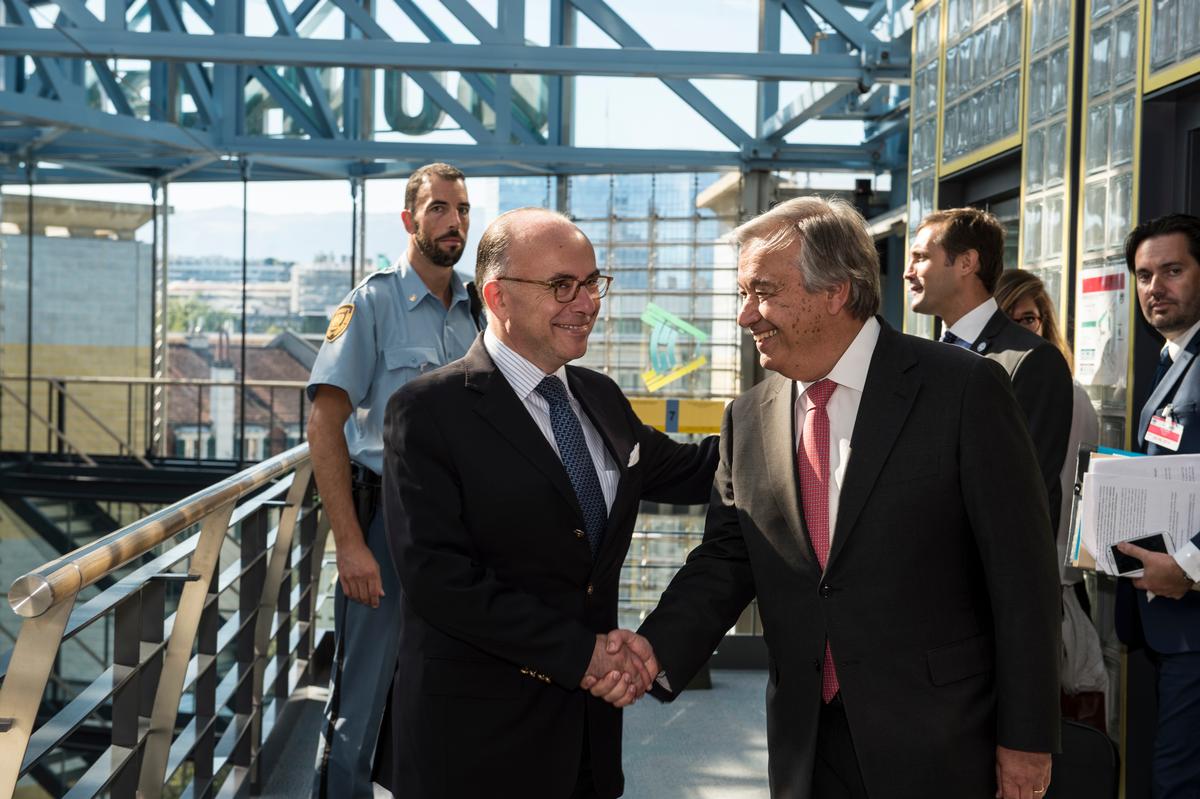UNHCR chief Guterres joins launch of new projects at Clinton meet
UNHCR chief Guterres joins launch of new projects at Clinton meet

NEW YORK, United States, September 24 (UNHCR) - UN High Commissioner for Refugees António Guterres has this week helped to formally launch technology-based projects that will improve the lives of refugees around the world.
The new initiatives, involving the provision of mobile phones and clean-burning stoves to the forcibly displaced, were officially launched this week at the annual meeting of the Clinton Global Initiative (CGI) in New York.
Guterres also welcomed a new CGI pilot programme to help thousands of forcibly displaced people in the Democratic Republic of the Congo (DRC). "Rethink Refugees" was announced on Thursday by former United States President Bill Clinton.
The CGI website said the project will help the displaced by "implementing existing innovative solutions in a new and challenging environment. The initiative will focus on replicable and holistic programmes in the areas of economic empowerment, education and energy." It will also provide leadership training to support refugees in rebuilding their lives and enhancing their own security, and engage the local private sector to create jobs.
On Tuesday, Clinton and his wife, US Secretary of State Hillary Rodham Clinton, had launched the Global Alliance for Clean Cookstoves, of which UNHCR is a founding partner. The High Commissioner attended the ceremony.
This multi-million-dollar public-private partnership plans to distribute 100 million clean-burning stoves in Africa, Asia and South America over the next 10 years. The beneficiaries will include refugees and internally displaced people (IDPs). Smoke inhalation from primitive indoor stoves causes up to 2 million deaths a year.
The Global Alliance for Clean Cookstoves, led by the United Nations Foundation, will bring together leading foundations, non-profit organizations, academic institutions, corporate leaders, governments and UN agencies to help promote and stimulate a thriving global market for clean stoves.
"Today we can finally envision a future in which open fires and dirty stoves are replaced by clean, efficient and affordable stoves and fuels all over the world - stoves that still cost as little as US$25," said Hillary Clinton. "By upgrading these dirty stoves, millions of lives could be saved and improved. Clean stoves could be as transformative as bed nets or vaccines."
Guterres said, "Environmental management is a priority for the organization and while already working on it with our partners, involving those displaced and local communities, we look forward to achieving a more holistic and sustainable strategy. Partnerships like this are key to obtaining such a goal."
In a separate announcement on Wednesday, UNHCR, Refugees United, Ericsson, Delta Partners and MTN in Uganda, joined by Emmanuel Jal, musician and former Sudanese refugee and child soldier, launched the first project to locate and reconnect refugee and IDP families through innovative use of mobile phones and the Internet.
A pilot programme has been set up for Sudanese refugees in Uganda. It allows for refugees to use mobile phones to register and search for family members via an anonymous database, and subsequently reconnect using mobile text messaging or the Internet.
Hans Vestberg, president and chief executive officer of the Swedish telecoms company, Ericsson, said the programme would help alleviate the suffering of forcibly displaced people "by helping reconnect those who have lost contact with their loved ones."
According to Refugees United, which is providing the service via computers and the Internet, less than 2 per cent of people in Africa have access to computers compared to more than 45 per cent that have a mobile phone.
Guterres, meanwhile, welcomed the increasing private sector support for UNHCR programmes. "The role of the private sector is increasingly important for humanitarian assistance. Lending their knowledge and expertise to support the refugee cause is crucial." During his week-long stay in New York, the High Commissioner has also attended the annual meeting of the UN General Assembly and met a number of world leaders.






